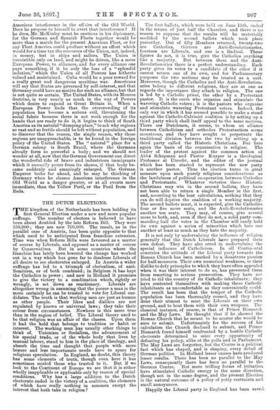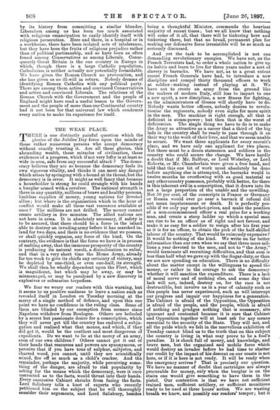THE DUTCH ELECTIONS. THE ki ngdom of the Netherlands has been
holding its first be General Election under a new and more popular suffrage. The number of electors is believed to have been about doubled by the late Reform Bill. They were 350,000; they are now 700,000. The result, as in the parallel case of Austria, has been quite opposite to that which used to be anticipated from franchise extension. Time was when Reform Bills were favoured as a matter of course by Liberals, and opposed as a. matter of course by Conservatives. But in some countries where the franchise has lately been lowered the change has worked out in a way which has gone far to disabuse Liberals of all desire to see electorates enlarged. In Austria a wider suffrage has led to a triumph of clericalism, of anti- Semitism, or of both combined; in Belgium it has kept the Catholics in power ; and now in Holland it promises to give the victory to a combination which, rightly or wrongly, is set down as reactionary. Liberals are altogether wrong in assuming that the poorer a man is the more certainly he can be trusted to vote for Liberal can- didates. The truth is that working men are just as human as other people. Their likes and dislikes are not regulated by known or universal laws ; they take their colour from circumstances. Nowhere is this more true than in the region of belief. The Liberal theory used to be that religion was an affair of the classes. Upon them it had the hold that belongs to tradition or habit or interest. The working man,,lutf, usually other things to think of. Unionism or socialism, the advancement of his special trade, or of the whole body that lives by manual labour, stand to him in the place of theology, and absorb the time and thought that people with more leisure and less importunate needs have to spare for religious speculation. In England, no doubt, this theory, has some elements of truth, though even here it has sometimes misled those who trusted to it. But if we look to the Continent of Europe we see that it is either wholly inapplicable or applicable only by reason of special conditions. Why has a large addition to the Dutch electorate ended in the victory of a coalition, the elements of which have really nothing in common except the interest that both take in religion ? The first ballots, which were held on June 15th, ended in the return of just half the Chamber, and there is no reason to suppose that the results will be materially modified by the second ballots which took place yesterday. Out of fifty Members returned, twenty-two are Catholics, thirteen are Anti-Revolutionaries, fourteen are Liberals, and one is a Radical. These figures do not, it is true, give the Catholics anything like a majority. But between them and. the Anti- Revolutionaries there is a perfect understanding. •Eaclx party gives its votes to a candidate of the other if it cannot return one of its own, and for Parliamentary purposes the two sections may be treated as a unit Moreover, though the Catholics and the Anti-Revolution- aries belong to different religions, they are at one as regards the importance they attach to religion. The one is led by a Catholic priest, the other by a Protestant pastor. It is the cures who organise and stimulate the wavering Catholic voters ; it is the pastors who organise. and stimulate wavering Protestant voters. Indeed, the only way in which it has seemed possible to make a stand against the Catholic-Calvinist coalition is by setting up a. third party which shall itself appeal to the same motives. There are Dutchmen, it seems, to whom an alliance between Catholicism and orthodox Protestantism seems monstrous, and they have sought to perpetuate the traditional division between the two by setting up a third party called the Historic Christians. But here again the basis of the organisation is religion. The leader of the protest against the common action of Abb4 Schapman and Pastor Kuyper is a theological Professor at Utrecht, and the editor of the journal which has been started to represent the new party is another pastor. Thus the election turns in great measure upon such purely religious considerations a& the lawfulness of political co-operation between Catholics- and Protestants. Whatever victories these Historic Christians may win in the second ballots, they have not been able to return a single Member in the first, and, according to the best calculations, nothing that they can do will deprive the coalition of a working majority. The second ballots must, it is expected, give the Catholics four or five more seats, and the Anti-Revolutionaries another ten seats. They may, of course, give several more to both, and, even if they do not, a solid party com- manding half the votes in the Chamber will easily hold its own against a series of minorities which hate one another at least as much as they hate the majority.
It is not only by undervaluing the influence of religion generally that the Dutch Liberals have prepared their- own defeat. They have also erred in undervaluing the special influence of Catholicism. In all Continental countries the attitude of the Liberal party towards the Roman Church has been marked by a disastrous passion for half-measures. Their own numerical weakness, or their- dislike to defy principles to which they have often appealed when-it was their interest to do so, has prevented them. from resorting to serious persecution. They have not tried to rid the country of its Catholic inhabitants ; they have contented themselves with making these Catholic inhabitants as uncomfortable as they couveniently could. The result has been that the temper of the Catholic population has been thoroughly roused, and they have done their utmost to meet the Liberals on their own ground, and to beat them with their own weapons. The classical instance, of course, is that of Prince Bismarck and the May Laws. He thought that if he showed the Roman Church that he meant to be master she would be sure to submit. Unfortunately for the success of his calculation the Church declined to submit, and Prince Bismarck found himself confronted by a hostile Catholic electorate determined to seize every opportunity of defeating his policy, alike at the polls and in Parliament. The May Laws are forgotten, but the Centre is a political fact which has shaped, and is shaping, every detail of *German politics. In Holland lesser causes have produced lesser results. There has been no parallel to the May Laws, consequently there has been no parallel to the German Centre. But more trifling forms of irritation have stimulated Catholic energy in the same direction, though not in the same degree, and the present Election is the natural outcome of a policy of petty restraints and small annoyances.
Happily the Liberal party in England has been savea by its history from committing a similar blunder. Liberalism among us has been too much associated with religious emancipation to easily identify itself with religious persecution. Here and there, in a hospital or in a workhouse, there have been isolated acts of intolerance, but they have been the fruits of religious prejudice rather than of political partisanship, and so have been as often found among Conservatives as among Liberals. Conse- quently Great Britain is the one country in Europe in which, though there is a large Catholic population, Catholicism is neither actually nor potentially formidable. We have given the Roman Church no provocation, and she has given us no in return. Nobody dreams of identifying Roman Catholics with any political party. There are among them active and convinced Conservatives and active and convinced Liberals. The relations of the Roman Church with the Government and the people of England might have read a useful lesson to the Govern- ment and the people of more than one Continental country had it not been for that universal law which condemns every nation to make its experience for itself.



















































 Previous page
Previous page